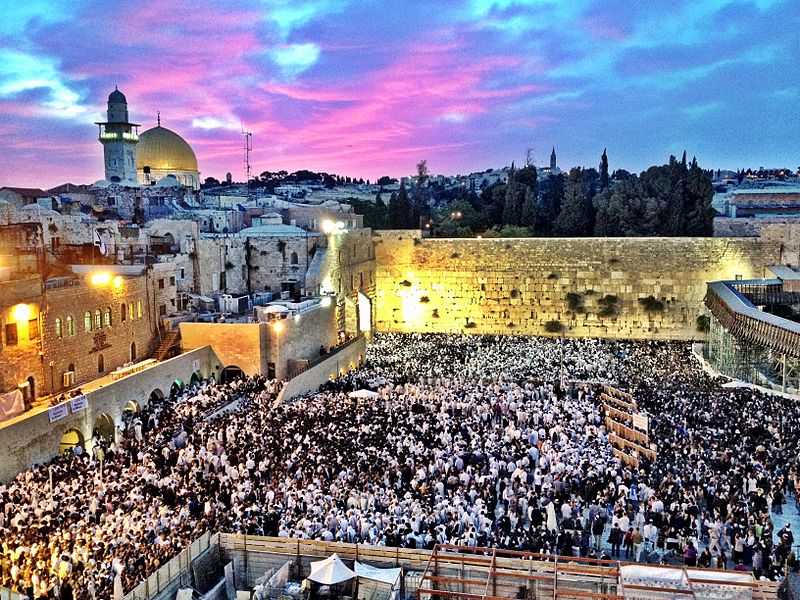This devar Torah is in
memory of Herb Smilowitz z'l, who recently passed away. He was a
humble and kind man, and a ba'al tzedaka and ba'al chessed of the
highest order. Among other causes, Mr. Smilowitz was a big supporter
of RIETS and Yeshivat Har Etzion (Gush). Although I did not know Mr.
Smilowitz well, through his children, I met him a number of times. I
was zocheh to hear some meaningful and powerful stories from his
family, during the time I was menachem avel. Mr. Smilowitz had money,
it did not have him. In a quiet and humble way, he used his wealth in
the most Godly manner possible. Yehi Zichro Baruch.
Herb Smilowitz z'l surrounded by Rabbi Zevulun Charlap and Rabbi Mark Smilowitz
This might be the only time in history when a man had to be "tricked" into being honored.
It's one of the best known
Rashis in the Torah
מה
ענין שמיטה אצל הר סיני
What
does Shemita have to do with Har Sinai?
This
question is asked by Rashi on the first passuk in Parshas Behar
וַיְדַבֵּר
יְהוָֹה אֶל־ מֹשֶׁה בְּהַר
סִינַי לֵאמֹר
Unlike
almost every time that HaShem speaks to Moshe, here, in introduction
to the laws of Shemitah and Yovel, the Torah notes that it happened
on Har Sinai. Why single out these mitzvos? Were all mitzvos not
given at Har Sinai? To answer the question Rashi explains that just
as Shemitah and all of its details were taught at Har Sinai, this
also applies to all of the other mitzvos in the Torah.
What
Rashi does not explain is why this
mitzvah is singled out to teach this lesson. What is unique about
Shemitah that it is chosen as an example?
Additionally,
we see elsewhere that Shemitah is serious enough to lead to exile and
other serious consequences when it is not followed. Why is this
mitzvah singled out for such severe consequences?
By
way of introduction, I will start with the second question first. The
Ramban suggests that shemitah teaches us about the messianic era,
which is represented by resting during the 7th
year. The Kli Yakkar suggests that Shemitah and Yovel are a
re-creation of Har Sinai. To prove his point, he points to several
allusions including the number 50 and the use of a shofar, which is
referred to in both contexts as a "yovel". As we will see
later on, there is no reason to suggest that these explanations are
mutually exclusive.
To
answer the first question, we need to look at some of the mitzvos
that are mentioned in this parsha:
Shemitah
Yovel
Freeing
of an Eved Ivri by Yovel at the latest
Ona'as
mamon (limits on profits) as well as Ona'as Devarim (hurtful words)
Prohibition
to permanently sell a field or most homes in Israel
Returning
of field to their original owner by Yovel
Prohibition
on charging interest
Prohibitions
against mistreating an Eved Ivri
Requirement
to redeem a Jewish slave from a non-Jewish owner
If
we look at the common denominator between these mitzvohs, we see that
the Torah is focusing on ownership and property in parshas Behar.
Despite the claims by different proponents of modern economic theory,
the Torah's approach to property and ownership is neither capitalist
or socialist. It is a unique system.
Bnei
Yisrael have left Egypt. They were there long enough to become
virtually identical to the Egyptians, both culturally and socially.
Just as somewhat paradoxically an abused child runs the risk of
becoming an abusive parent, and a captive runs the risk of
experiencing Stockholm Syndrome, there was a very real risk that,
with the gaining of independence and power, Bnei Yisrael would take
an Egyptian view of possesions, particularly to ownership of slaves.
It is not surprising that the Torah here uses the word פרך
the
very same word used to described how BY were enslaved, in discussing
the prohibitions of mistreating an Eved Ivri. The Torah also talks of
treating him as a תושב,
another allusion to the slavery which took place in Egypt. Most
telling are the words of HaShem כִּי־עֲבָדַי
הֵם אֲשֶׁר־הוֹצֵאתִי אֹתָם מֵאֶרֶץ
מִצְרָיִם.
Do not think of your slaves as your own. All of you belong to me.
The
other mitzvos listed above, also place strong limitations on
ownership, from limiting profit, to prohibiting permanent sale of
land and property, to prohibiting the charging of interest. What, in
the name of Adam Smith is going on here?
After
creating man, HaShem blesses them saying
וַיְבָרֶךְ
אֹתָם אֱלֹהִים וַיֹּאמֶר לָהֶם אֱלֹהִים
פְּרוּ וּרְבוּ וּמִלְאוּ אֶת־ הָאָרֶץ
וְכִבְשֻׁהָ וּרְדוּ בִּדְגַת
הַיָּם וּבְעוֹף הַשָּׁמַיִם וּבְכָל ־חַיָּה
הָרֹמֶשֶׂת עַל־ הָאָרֶץ
Be
fruitful, fill the land and be koveish it. What is the meaning of
that word? Ordinarily, we translate it as conquer, but I think it
could also mean something else here. Chazal speak of being koveish
one's Yetzer HaRa. In that context, I would suggest it means more of
channeling one's physicality, rather than conquering it. Here God is
dealing with something inherent in man, and, I believe, particularly
inherent in men. Man can be a conqueror. One who aims to control
everything and everyone. A person who views the world in a binary
way, saying "What's mine is mine and what's yours is yours"
and "kochi v'otzem yadi". God is blessing us to view things
differently. In the next passuk he says
וַיֹּאמֶר
אֱלֹהִים הִנֵּה
נָתַתִּי לָכֶם אֶת ־כָּל ־עֵשֶׂב
׀ זֹרֵעַ זֶרַע אֲשֶׁר עַל־פְּנֵי כָל
־הָאָרֶץ וְאֶת ־כָּל־ הָעֵץ אֲשֶׁר ־בּוֹ
פְרִי־עֵץ זֹרֵעַ זָרַע לָכֶם יִהְיֶה
לְאָכְלָה
Remember,
says HaShem, I am the source of everything you have. Use it, but use
it for a Divine purpose.
Now
we can return to our original question, Why are these mitzvos
specifically mentioned as coming from Har Sinai? If we think of what
we know of Har Sinai, we begin to see an answer. Chazal say that by
the giving of the Torah, Bnei Yisrael reached the level of Adam
HaRishon before the sin. The goal of the Torah is for us to perfect
ourselves and through our actions, the world. Although that level was
inherently
unsustainable at the time of Matan Torah, the Kli Yakar suggests
that we receive a reminder of that goal through Shemitah, Yovel, and,
I would add, the other mitzvos of this parsha. Moving over to the
Ramban, these mitzvos are a reminder of the messianic era, the time
when God's ideal world will be realized. Through a recognition of the
limits of our ownership, we are reminded that we and all that we
have, belong to HaShem, and that we should treat each other and make
use of our possessions, in a way that shows we realize this. Our
choice is to conquer and control the world, or to perfect it.













